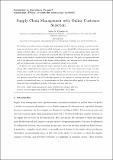Supply Chain Management with Online Customer Selection
Author(s)
Elmachtoub, Adam N.; Levi, Retsef
DownloadSupply chain management.pdf (491.3Kb)
OPEN_ACCESS_POLICY
Open Access Policy
Creative Commons Attribution-Noncommercial-Share Alike
Terms of use
Metadata
Show full item recordAbstract
We consider new online variants of supply chain management models, where in addition to production decisions, one also has to actively decide on which customers to serve. Specifically, customers arrive sequentially during a selection phase, and one has to decide whether to accept or reject each customer upon arrival. If a customer is rejected, then a lost-sales cost is incurred. Once the selection decisions are all made, one has to satisfy all the accepted customers with minimum possible production cost. The goal is to minimize the total cost of lost sales and production. A key feature of the model is that customers arrive in an online manner, and the decision maker does not require any information about future arrivals.
We provide two novel algorithms for online customer selection problems, which are based on repeatedly solving offline subproblems that ignore previously made decisions. For many important settings, our algorithms achieve small constant competitive ratio guarantees. That is, for any sequence of arriving customers, the cost incurred by the online algorithm is within a fixed constant factor of the cost incurred by the respective optimal solution that has full knowledge upfront on the sequence of arriving customers. Finally, we provide a computational study on the performance of these algorithms when applied to the economic lot sizing and joint replenishment problems with online customer selection.
Date issued
2016-02Department
Sloan School of ManagementJournal
Operations Research
Publisher
Institute for Operations Research and the Management Sciences (INFORMS)
Citation
Elmachtoub, Adam N. and Levi, Retsef. “Supply Chain Management with Online Customer Selection.” Operations Research 64, no. 2 (April 2016): 458–473.
Version: Author's final manuscript
ISSN
0030-364X
1526-5463